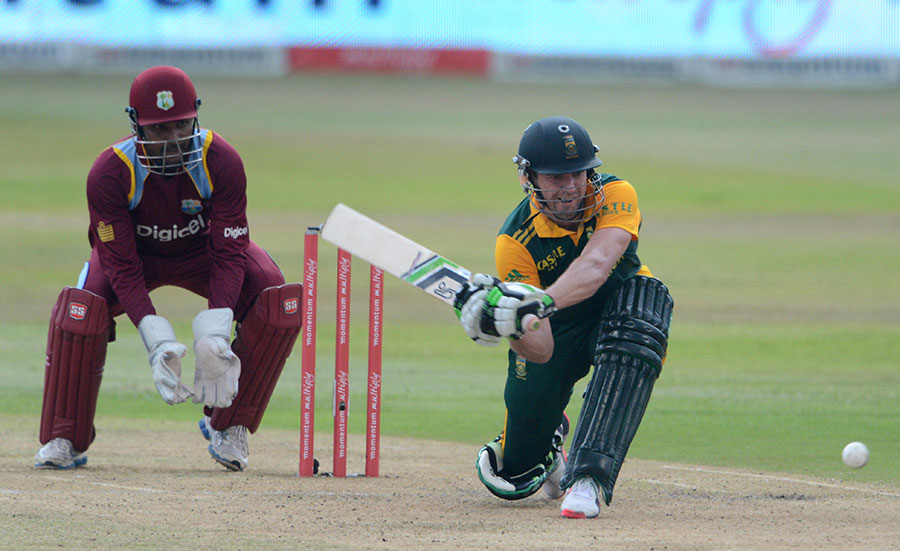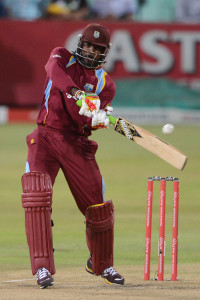Hashim Amla became the fastest South African batsmen to reach 5000 ODI runs a run-a-ball 66 in his 101st innings and set South Africa up to take the series lead. He starred in a 99-run third-wicket stand with AB de Villiers, in which runs were scored at 6.82 to the over before de Villiers and David Miller posted 123. That ensured even when South Africa fell away and lost 5 for 34, they still had enough despite the two-hour-45-minute rain interruption.
West Indies’ target was adjusted to a 229 off 33 overs and then 226 off 32 overs when rain returned again but they were only in with a chance of chasing it when Chris Gayle was at the crease. He plundered 41 runs off 24 balls but his high-risk style of play left him vulnerable to an early dismissal. When it came in the sixth over, it sparked a top-order collapse of 4 for 38 which gave way to a lower-order folding of 6 for 46. Imran Tahir claimed three of those wickets chiefly through well-executed googlies and sliders to bring up his 50th ODI scalp.
Jason Holder, in his first match as captain, would have wanted more from the men he said were ready to show fight. He shouldered the bulk of that responsibility when he opened the bowling, brought himself back on at crucial times, tasked himself with targeting the South African lower-order and ran an impressive 9.8 kilometres in the field but he learnt that one man cannot do the job on his own. Just ask Gayle.
After missing out on Wednesday night’s T20, also at Kingsmead, with a recurrence of his back problem, Gayle approached this innings as though it was two days’ ago. He flung his bat at everything, despite the steep target. “I am trying to understand it, but I can’t,” Michael Holding lamented, when discussing Gayle’s strategy, or lack thereof. It only took the introduction of Dale Steyn to cause Gayle to run out of luck and allow South Africa the only inroad they needed.
Gayle should have modelled his innings on Amla’s to start with. He saw off a tricky opening period, when Jerome Taylor found the right length to dismiss both Rilee Rossouw, who racked up a fifth duck in 10 innings, and Faf du Plessis, a first duck in 61, in the Powerplay. But West Indies failed to cash in on their early breakthroughs and lost their lines.
They offered so much width. Amla was able to treble his score from 13 off the first 19 balls he faced to 39 by the time he’d faced 40. AB de Villiers, sent in earlier than usual at No. 4, was also off to a speedy start. 17 runs came off 15 balls.
Andre Russell tried to make the extra bounce work in his favour by holding back his length but the South African pair were quick to pounce on anything short. They brought up a hundred inside 17 overs and a massive total was looming but Amla was in such a hurry to get there, he underestimated Russell’s arm. He was run-out but South Africa’s momentum was not.
They promoted David Miller ahead of JP Duminy and de Villiers immediately adjusted his pace. He slowed down to allow Miller to settle and the pair formed the spine of South Africa’s total. They shared the highest partnership of the innings of 123 runs and batted for a ball shy of 20 overs, to take South Africa to the brink of a flourishing finish as West Indies flagged in the searing heat.
It was only when both holed out that West Indies had the opportunity to come back into the match. Russell used fancy footwork to run Farhaan Behardien out – the second time on this tour his boot has ushered the ball on its way to breaking the stumps – had Duminy caught behind off a short ball and Philander in the deep before a storm swept through.
It was accompanied by gale-force winds, of the literal kind, which only made it more difficult for South Africa when they took the field and met the other Gayle-force. West Indies were off to a flier but they needed support from the rest of the line-up, particularly the experience.
But Marlon Samuels was run out lazily, Dwayne Smith was deceived by a slider and Jonathan Carter beaten by the googly. Vernon Philander was rewarded for consistent effort towards the end and Steyn cleaned up the tail as the inevitable outcome was completed.



